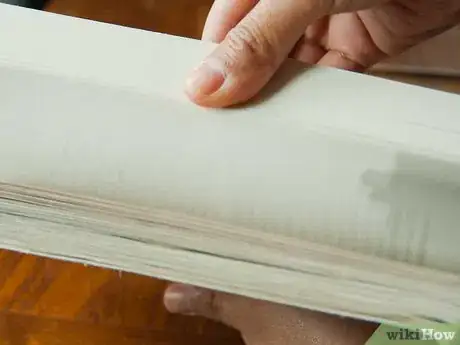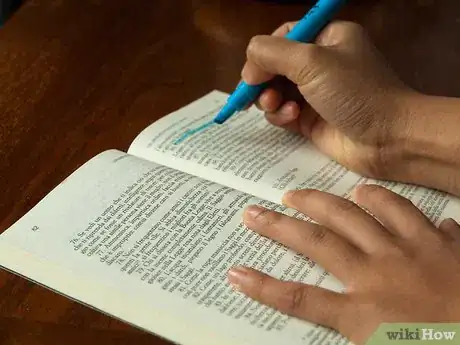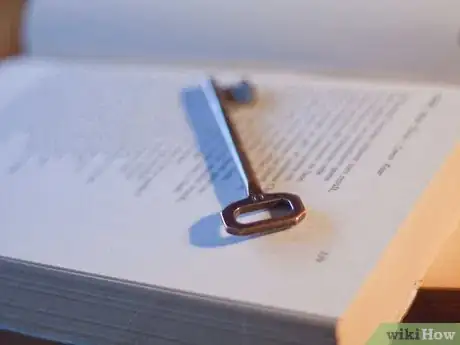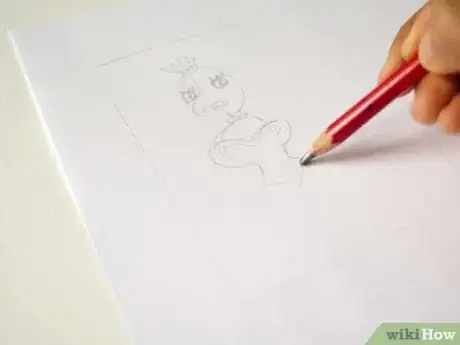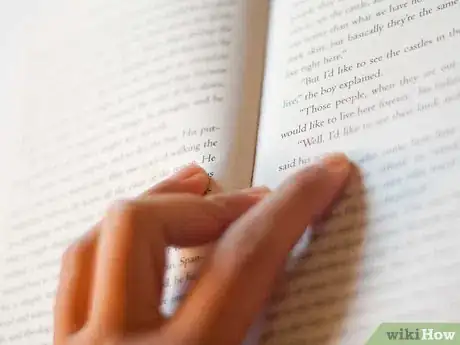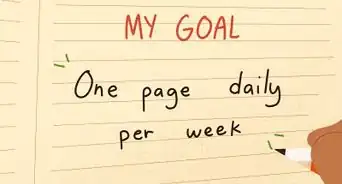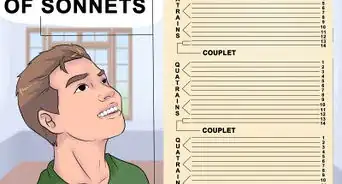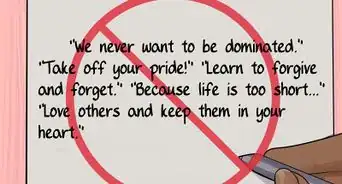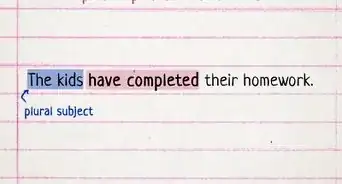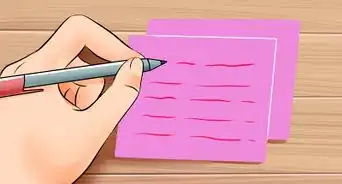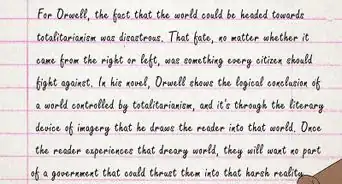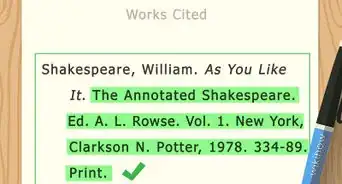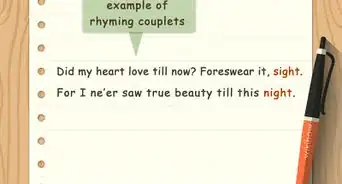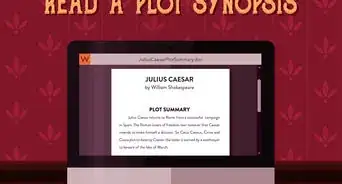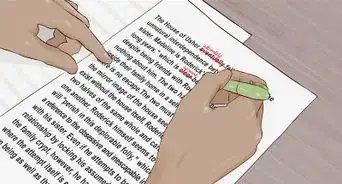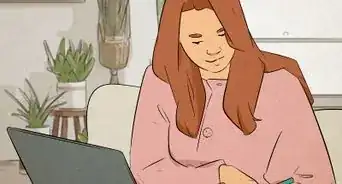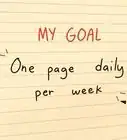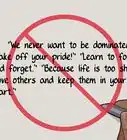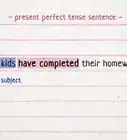wikiHow is a “wiki,” similar to Wikipedia, which means that many of our articles are co-written by multiple authors. To create this article, volunteer authors worked to edit and improve it over time.
This article has been viewed 23,051 times.
Learn more...
“The person, be it gentleman or lady, who has not pleasure in a good novel, must be intolerably stupid.” ― Jane Austen
For some reason you found yourself in the position that you want or need to read a novel. You might as well go deep and submit to the novel for the purpose of pleasure, entertainment or even for the purpose of educating yourself. But alas, appreciating a novel goes deeper than you initially thought and you are now, in slight fomentation, not knowing what to do to finish your endeavor. But really, read on and take a step further into reading. You might find, as most people do, that reading novels and books can be a worthwhile past time.
Steps
-
1Measure your reading level. Don't expect or force yourself to appreciate Shakespeare or Canterbury Tales on your first time. If you need to, start on easy reading books. Don't be afraid to start with children's books, adults are supposed to enjoy them too.
- “A children's story that can only be enjoyed by children is not a good children's story in the slightest.”― C.S. Lewis
-
2Choose your books properly. After assessing your reading level, get a list of suggested books from a person who knows a great range of books. It might be your teacher, librarian, or even that elderly neighbor across the street.
- You might want to start with classics. There's a big reason why they managed to survive through time --- because of their timeless content, designed to be appreciated by people from different generations.
Advertisement -
3Choose books that match your interests and personality. It's no use hovering over books about things you're not particularly interested in, especially when you're a novice reader. It might scrape you all of your interest and enthusiasm about starting to read.
- “If you cannot read all your books...fondle them---peer into them, let them fall open where they will, read from the first sentence that arrests the eye, set them back on the shelves with your own hands, arrange them on your own plan so that you at least know where they are. Let them be your friends; let them, at any rate, be your acquaintances.”― Winston Churchill
-
4Read the summary or read reviews about the book. By all means, don't be shy about getting some recommendations for reading. Read the summary so you know what you're reading about. Life is too short to waste your time in a book that you can't learn from.
-
5Don't be afraid to "vandalize" your book (Skip this step if you're borrowing the book from the library or from someone.) Most readers are so afraid of getting ink into their book papers, depriving themselves of further education and enjoyment. Books have margins not only so the pages look neat and organized. Publishers add margins so readers can actually write phrases and comments on them.
- Comment on particular phrases that caught your attention. This will make you remember the phrase and would help you remember it when chances come that you might want to say something about that particular phrase.
- Whenever you encounter a new word, grab a dictionary and look for it's definition. Use the word immediately in a sentence. By the end of the book, you'll be surprised to know how much words have been added to your vocabulary.
- “I kept always two books in my pocket, one to read, one to write in.”― Robert Louis Stevenson
-
6List down or highlight quotes. You might be surprised about the amount of inspiration, lessons and humor that you can get by remembering quotes from books. They're mighty useful too. Use them in greeting cards, in speeches etc.
- Highlight quotes using crayons or something that won't seep through the page.
- List them out in a small notebook for handy everyday use.
-
7Learn more about the details of the book. Encountered something that piqued your interest? Research more about it! Books (especially classics) have history in them and what better way to learn painlessly than by learning through the experience of others? If you're reading Les Miserables or Hunchback of Notre Dame, by all means, feel free to learn about France and their culture. This will not only educate you, it will also help you imagine the scene of the book more.
- “Fairy tales are more than true: not because they tell us that dragons exist, but because they tell us that dragons can be beaten.”― Neil Gaiman, Coraline
-
8Learn more about the author. Learning more about the author of the novel actually makes you realize more about how the book came to be. You will learn the harmony and the irony of human mind as well as the fascinating things that might come from something or someone so ordinary.
- “I don't believe in the kind of magic in my books. But I do believe something very magical can happen when you read a good book.”― J.K. Rowling
-
9Think about the lessons you learn about the books. Books without lessons are of no value. After reading a book, or even while reading it, think of the lessons and morals the author wants to impart you. Does it teach about true love, real friendship, bravery or finding your true self? Don't forget to dig deeper into phrases and conversations as you go.
- “The more that you read, the more things you will know. The more that you learn, the more places you'll go.”― Dr. Seuss, I Can Read With My Eyes Shut!
-
10Share it. Oh, the joy of making friends through books. Share what you learned, share your new found passion. Join a book club and meet people with the same interest, you'll be amazed how talking about a single book can really liven up conversations. Who knows? You might even help someone realize their dream and future career.
- “If we encounter a man of rare intellect, we should ask him what books he reads.”― Ralph Waldo Emerson
-
11Do some extra work. By extra work, I mean, go extra miles to appreciate the book.
- Read art books about the book you just read, if they are available. Some publishers publish art books for collectors and fans.
- If you're into art, draw/paint characters from the book or the scenery.
- If movies/musicals about the book are available, try to watch them as they might help you clarify events better.
- If you're into music and you liked the soundtracks from the movie/musical, find some time to learn them or even just listen to them
- If you don't have your own books, make a step and start building your own library of personal favorites.
- “It is a great thing to start life with a small number of really good books which are your very own.”― Arthur Conan Doyle
-
12Read more books similar to the book you last enjoyed. Now that you have tried reading a novel (and hopefully, have enjoyed it,) it's now time to read another book. The next book could (though not limited to) be similar to the one you have just read --- it might be of the same theme, scenario, author or similar plot.
- If before, you can only read 5mins/day (which is considerably good for first-timers) you may want to increase it every time until you can genuinely say that you prefer books over other hobbies like watching reality shows and playing violent video games.
- “I find television very educating. Every time somebody turns on the set, I go into the other room and read a book.”― Groucho Marx
Community Q&A
-
QuestionDo you think these apply to all mediums of narrative? How about movies or video games?
 LouisaCommunity AnswerIn some way or another, yes. You can apply the basic concepts of choosing what interests you and assessing your skill level.
LouisaCommunity AnswerIn some way or another, yes. You can apply the basic concepts of choosing what interests you and assessing your skill level.



